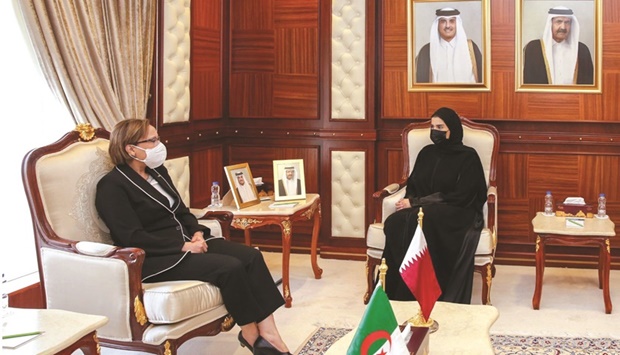HE Minister of Social development and Family Maryam bint Ali bin Nasser al-Misnad met with Minister of National Solidarity, Family and Women's Issues of Algeria Kawthar Kriko, who visited the country as a member of the delegation accompanying the Algerian president.
The meeting reviewed aspects of the joint co-operation between the two countries in the fields related to social affairs and the family, and ways of enhancing and developing them, especially those related to the establishment of mutual exhibitions that support projects of productive families and women and building the capacities of cadres concerned with social protection programs.
HE al-Misnad referred to the Memorandum of Understanding for co-operation between the two countries in the fields of Social development and the family, which was signed in Doha on the sidelines of the visit of Algerian President Abdelmadjid Tebboune, stressing the importance of this memorandum for the development of bilateral co-operation in social and family affairs.
HE the Minister added that the MoU reflects the commitment of the wise leaderships in the two brotherly countries to sponsoring and supporting the bilateral co-operation in the areas of Social development, based on the values of joint responsibility that link Qatar and Algeria.
For her part, Minister Kawthar Kriko underlined her country's keenness to make all efforts to activate the terms of the signed MoU, especially in the areas of transferring and exchanging experiences, and building capacities in support of social development projects, mainly the initiatives to empower productive families, persons with disabilities and women.
On the other hand, the Algerian minister visited a number of social institutions in the country, such as the Family Consulting Center (Wifaq), the Shafallah Center for Persons with Disabilities, and the Protection and Social Rehabilitation Center (Aman) to learn about the Qatari experience in social work. In this context, she expressed her admiration for the available capabilities and services provided in these centers for the concerned groups and cases, and the possibility of benefiting from them in the context of exchanging experiences between the two countries. She said that the services of these centers represent the core of social work that reflects responsibility towards societies.
The meeting reviewed aspects of the joint co-operation between the two countries in the fields related to social affairs and the family, and ways of enhancing and developing them, especially those related to the establishment of mutual exhibitions that support projects of productive families and women and building the capacities of cadres concerned with social protection programs.
HE al-Misnad referred to the Memorandum of Understanding for co-operation between the two countries in the fields of Social development and the family, which was signed in Doha on the sidelines of the visit of Algerian President Abdelmadjid Tebboune, stressing the importance of this memorandum for the development of bilateral co-operation in social and family affairs.
HE the Minister added that the MoU reflects the commitment of the wise leaderships in the two brotherly countries to sponsoring and supporting the bilateral co-operation in the areas of Social development, based on the values of joint responsibility that link Qatar and Algeria.
For her part, Minister Kawthar Kriko underlined her country's keenness to make all efforts to activate the terms of the signed MoU, especially in the areas of transferring and exchanging experiences, and building capacities in support of social development projects, mainly the initiatives to empower productive families, persons with disabilities and women.
On the other hand, the Algerian minister visited a number of social institutions in the country, such as the Family Consulting Center (Wifaq), the Shafallah Center for Persons with Disabilities, and the Protection and Social Rehabilitation Center (Aman) to learn about the Qatari experience in social work. In this context, she expressed her admiration for the available capabilities and services provided in these centers for the concerned groups and cases, and the possibility of benefiting from them in the context of exchanging experiences between the two countries. She said that the services of these centers represent the core of social work that reflects responsibility towards societies.

